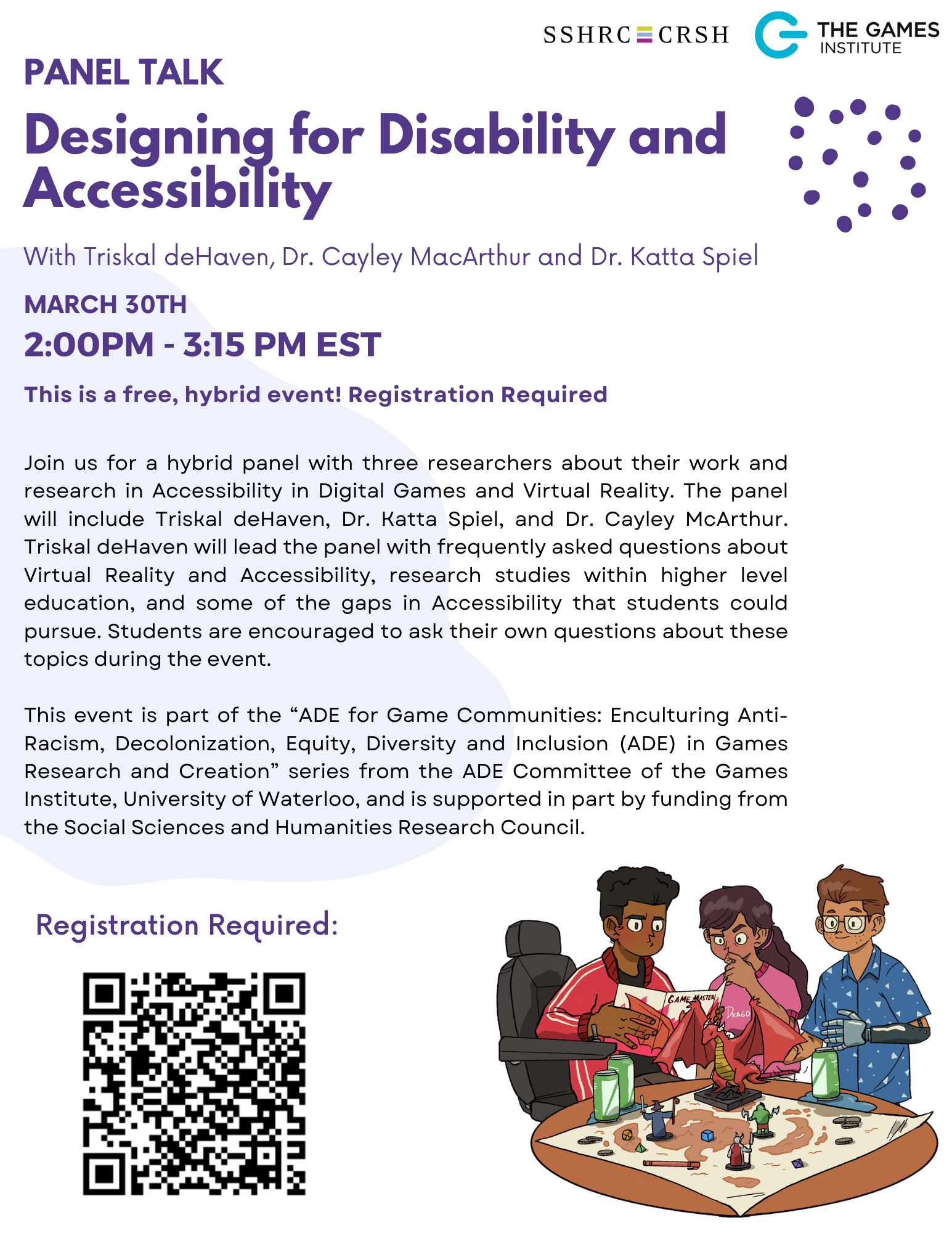
Join
us
for
a
hybrid
panel
with
three
researchers
about
their
work
and
research
in
Accessibility
in
Digital
Games
and
Virtual
Reality.
The
panel
will
include
Triskal
deHaven,
Dr.
Katta
Spiel,
and
Dr.
Cayley
McArthur.
Triskal
deHaven
will
lead
the
panel
with
frequently
asked
questions
about
Virtual
Reality
and
Accessibility,
research
studies
within
higher
level
education,
and
some
of
the
gaps
in
Accessibility
that
students
could
pursue.
Students
are
encouraged
to
ask
their
own
questions
about
these
topics
during
the
event.
This
event
is
part
of
the
“ADE
for
Game
Communities:
Enculturing
Anti-Racism,
Decolonization,
Equity,
Diversity
and
Inclusion
(ADE)
in
Games
Research
and
Creation”
series
from
the
ADE
Committee
of
the
Games
Institute,
University
of
Waterloo,
and
is
supported
in
part
by
funding
from
the
Social
Sciences
and
Humanities
Research
Council.
About
the
Speakers:
Triskal
DeHaven:
Triskal
is
a
User
Experience
Researcher
who
uses
Qualitative
methods
to
enable
video
game
developers
to
create
their
desired
player
experiences.
He
has
extensive
knowledge
on
Accessibility
in
Digital
Games
and
Virtual
Reality.
When
he
isn’t
working,
he
loves
playing
RPGs
with
friends,
hiking
with
his
Doberman,
or
working
out
at
the
gym
with
his
partner.
Dr.
Cayley
MacArthur:
Cayley
MacArthur,
Ph.D.
is
a
Games
Institute
member
specializing
in
human-computer
interaction
(HCI)
research,
with
a
focus
on
inclusive
technologies
and
inclusion
in
technology.
The
implications
of
this
work
are
broad:
working
on
inclusion,
diversity,
equity,
and
accessibility
in
HCI
requires
interrogating
the
perspectives,
assumptions,
methods,
and
artifacts
encountered
in
our
approaches
to
research,
design,
and
the
development
of
new
and
existing
technologies.
She
has
published
and
presented
interactive
demos
at
top
venues
in
her
field.
Cayley
is
also
actively
engaged
in
the
research
community
and
has
served
on
the
organizing
or
program
committees
of
CHI
2022,
DIS
2021,
CHI
2019,
CHI
2018,
CHIPLAY
2020,
and
ISS
2018.
Dr.
Katta
Spiel:
Katta
Spiel
is
an
FWF
Hertha-Firnberg
scholar
at
the
HCI
Group
of
TU
Wien
(Vienna
University
of
Technology),
where
they
work
on
the
intersection
of
Computer
Science,
Design
and
Cultural
Studies.
Katta
researches
marginalized
perspectives
on
technologies
to
inform
interaction
design
and
engineering
in
critical
ways
so
they
may
account
for
the
diverse
realities
they
operate
in.
Drawing
on
methods
from
(Critical)
Participatory
Design
and
Action
Research
on
a
background
heavily
shaped
by
Queer
Theories
and
Disability
Studies,
they
collaborate
with
neurodivergent
and/or
nonbinary
peers
in
conducting
explorations
of
novel
potentials
for
designs,
methodological
contributions
to
Human-Computer
Interaction
and
innovative
technological
artefacts.